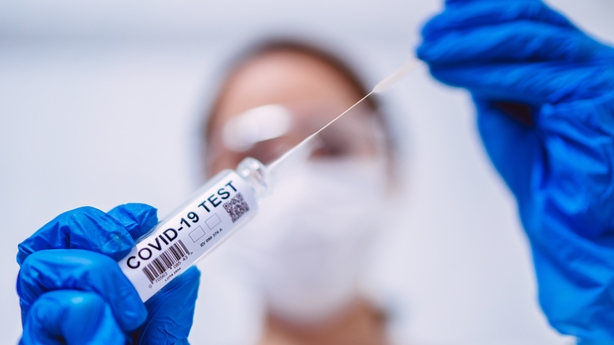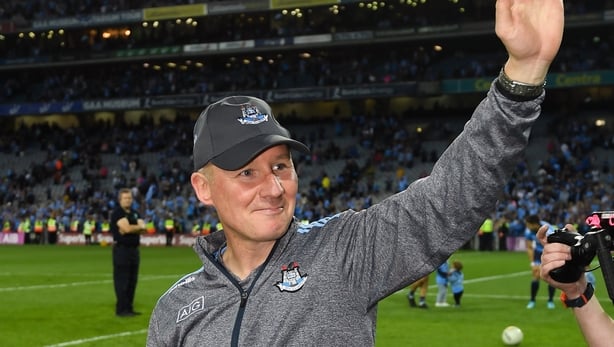The Chief Executive of the Health Service Executive warned the public about becoming complacent in light of the reduced number of Covid-19 cases in recent days.
Paul Reid told RTÉ News that it was still early days and he wanted to urge a lot of caution.
He said that as a country we are going to buck the trend of other European countries when it comes to the spread of the virus.
People must keep resilient and stay resolved to avoid contracting the virus, he said.
Mr Reid also said there has been a significant drop in the demand for testing, mainly due to a reduction in the number of confirmed cases, a drop in the positivity rate, which has been less than 5% in the last two days, and the reduction in the number of close contacts from six to under three.
He said 100,000 tests were carried out last week and the system has the capacity for 120,000.
Mr Reid said he wanted to reassure parents, teachers and school principals of the low incidence of Covid-19 in schools.
He said additional resources would be provided to schools this week that will enhance the services and supports available in the coming weeks.
The HSE Chief also said there are promising signs on the availability of a vaccine, but added that it was early days.

GPs on the ground have also noticed a slight reduction in demand for testing.
Dr Nuala O'Connor, the ICGP's lead on Covid-19, said that mid-term is usually quieter anyway, but "the number of people phoning in with symptoms seems to have reduced a little".
"It was rising very much since the start of September," she said, however overall there are still quite a lot of people with symptoms.
Dr O'Connor re-emphasised the need for people with symptoms to stay at home.
She said that while there is a lot of focus on testing and tracing, it's actually the action you take when you feel unwell that is important.
"That's what stop the virus spreading, it's not the test that stops it spreading," she said.
Dr O'Connor said that it is going to be "vital" that when we hopefully come out of Level 5, the messages around self isolation and restricting movements remain.
"Personal responsibility is what is going to get us out of lockdown and prevent us from going back into restrictions in the future," she said.
Dr O'Connor said it is great to see some positive signs but we do need to be careful about how we interpret these trends.
She said we don't want people to think everything is OK now or that we can start to relax.
"We can't afford to relax. We have seen how quickly, when we let our guard down, how quickly it can flare up. We all need to be on our guard, probably for many months to come."
The Chair of the National Public Health Emergency Team's Covid-19 expert advisory group, Dr Cillian De Gascun, has said the decline in cases being seen at the moment "probably started as a result of the enhanced Level 3 restrictions".
Speaking on RTÉ's This Week, Dr De Gascun said however that while Level 3 can stabilise the outbreak at a particular level, it "probably isn't sufficient to reduce the growth rate" of the virus.
"The decline in cases probably started as a result of the Level 3 restrictions," he said.
"We won't have seen the full impact of Level 5 yet, but its likely what we saw as a result of the national Level 3 and then the localised Level 4 around the border started to have an impact."
Earlier a Cork-based GP said he does not think Level 3 Covid-19 restrictions were working country-wide, and that Level 5 restrictions "were needed at the time".
Speaking on RTÉ Radio, Dr Phil Kieran said that during his work as a GP he had seen a lot of people who were "absolutely not abiding by the rules".
There was "some evidence" that case numbers in Dublin were starting to drop, he said, but across the country numbers were "climbing and climbing".
He added that one of the big problems was that our ability to trace and follow-up with contacts was being "completely overwhelmed".
"Everyone's talking about how the hospitals and the ICUs weren't as full as they were back in the earlier lockdown, but the big problem was we were losing control of our ability to get out ahead of the virus and to reduce the amount of contacts people were having. So I think Level 5 was completely necessary at the time it was brought in," he said.

Airline industry decimated - Gavin
The Assistant Director of the Irish Aviation Authority, former Dublin football manager Jim Gavin, has said the industry has been "decimated".
Speaking to RTÉ's Damien O'Reilly, he said the situation is "unsustainable" in the long term.
People are not going to travel if they will be required to quarantine upon arrival at their destination, he said.
"The industry itself is doing all it can," Mr Gavin said.
"There was a conference last week with EU leaders and they all agreed that they need to quickly validate the new rapid antigen testing system, and I think that is a game changer."







